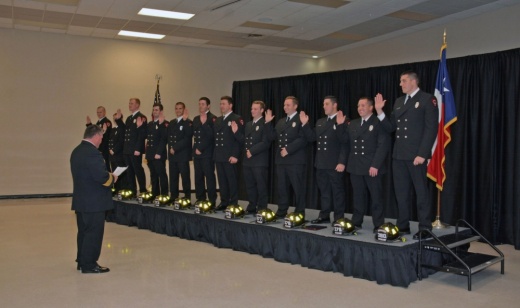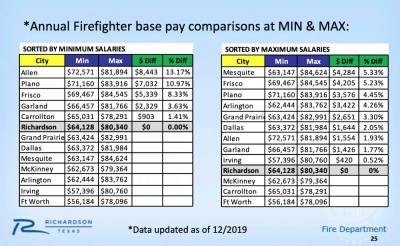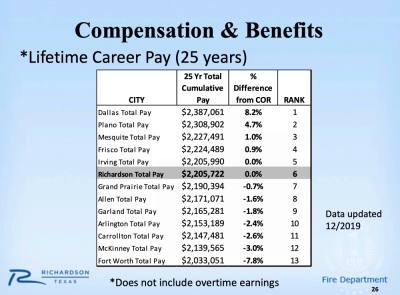The presentation was given by Chief Curtis Poovey at the Fire Training Center in Richardson. It covered staffing, training, compensation and benefits as well as an overview of equipment, daily tasks, operational statistics, what is next for the department and more.
The subject of firefighter pay sparked a lengthy debate between council and staff. Each year, staff compares Richardson’s compensation package to that of nearby cities to ensure Richardson is staying competitive, according to Jose Moreno, director of human services.
“We strive each year to review and maintain our competitive compensation package,” he said.
The city aims to be within the top third of 12 benchmark cities in terms of base pay. But it must balance competitiveness with financial sustainability, and each year this becomes more difficult, Moreno said.
Compared to its 12 nearby cities, Richardson currently ranks sixth in terms of minimum annual salary at $64,128 and 10th in terms of maximum salary at $80,340.
Maximum pay is dependent on a number of factors and varies from city to city, Moreno explained. In Richardson, firefighter salaries progress on a 5% step schedule. The first two 5% pay increases are given within the first year, Poovey said.
Richardson is not as competitive as it would like to be in terms of base pay; however, Council Member Steve Mitchell said what matters is how quickly firefighters reach their maximum salary. In Richardson, firefighters top out in four years, which is much faster than other cities, Mitchell said.
The city with the highest starting pay is Allen, which offers a minimum base salary of $72,571. The highest maximum salary is offered by Mesquite, which tops out at $84,624.
In terms of lifetime career pay, Richardson ranks sixth at roughly $2.2 million. The city with the highest lifetime pay is Dallas at $2.4 million.
Richardson also offers special incentive pay, which encourages the mastering of technical skills and continuing education. Firefighters can earn incentive dollars for a range of achievements, such as longevity with national organizations, special assignments, certifications, and educational or fitness achievements, Poovey explained. For comparison, only two other benchmark cities offer a fitness incentive, he added.
The city’s benefit package is also more robust than most benchmark cities, Moreno explained. Richardson offers all types of benefits, including pension pay, social security benefits, medical and dental insurance, and both non-Medicare and Medicare retiree insurance.
Public safety costs currently make up 42% of the city’s total operating budget, and roughly 18% of that goes toward the fire department, Moreno said. But revenues and expenditures are bound to take a hit once Senate Bill 2 takes effect in fiscal year 2020-21, he said.
SB 2 caps the amount of property tax dollars the city can collect. Staff projects that in FY 2020-21, appraisal value revenue will drop to $2.2 million, which is less than half of the $5.4 million revenue estimate projected for FY 2019-20.
Hamstringing of the city’s budget could slow the pace of public service, Council Member Janet Depuy remarked. Therefore, the city will have to get creative in figuring out how to remain competitive with surrounding municipalities.







